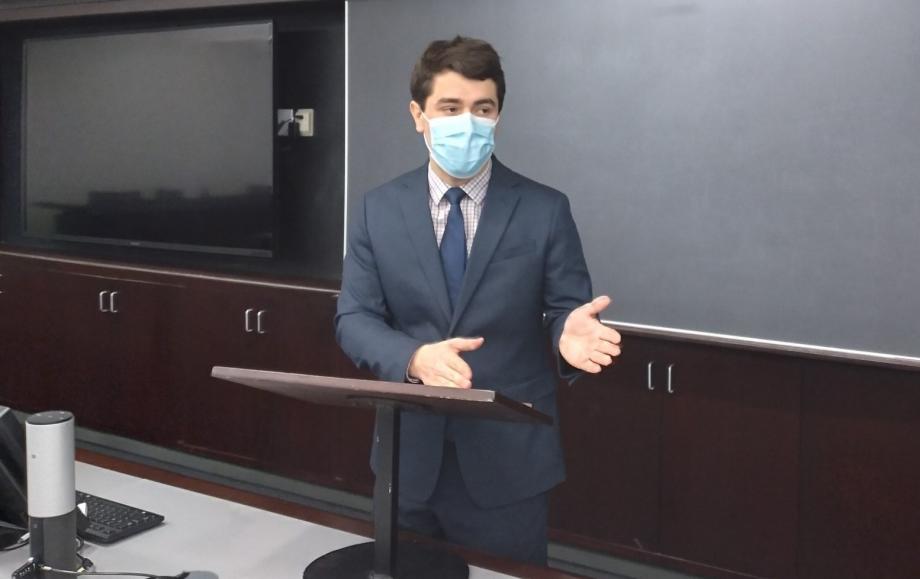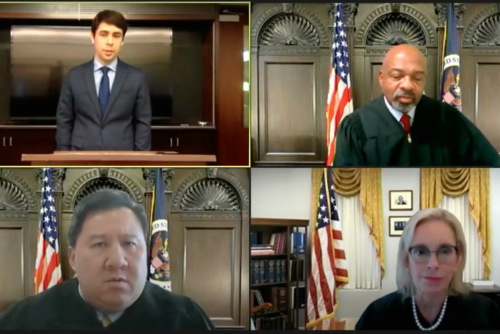Logan Kirkpatrick, ’23, Wins ‘Best Oralist’ in ABA Moot Court Competition

When Logan Kirkpatrick, ’23, looked into his laptop camera to argue the final round of the American Bar Association’s First Amendment and Media Law Diversity Moot Court Competition last month, he had already faced many of the challenges of competing as a first-year law student in the middle of a global pandemic.
He’d worked his way through complicated questions in a hypothetical defamation lawsuit despite never having taken a First Amendment law class. He’d written a 20-page brief while juggling various aspects of his summer job search and before the brief writing component of his Legal Research and Writing course. And, during the semifinals, he’d grappled with the discomfort of arguing via Zoom—an adjustment from the in-person moot court and mock trial competitions he’d participated in during high school and college. Before both the semifinal and final rounds, he’d practiced alone, talking to the wall in the Law School seminar room he’d reserved for use during the Zoom portions of the competition.
By the day of his final argument—delivered before three federal appellate judges—he was ready, and it showed. Kirkpatrick won the competition’s “best oralist” award, an honor that came with a $2,000 prize. In addition, he and Emory Powers, a second-year student at the University of Houston Law Center with whom Kirkpatrick was paired for the later rounds, won the Carolyn Forrest Moot Court Recognition of Achievement as the second-place finishers. (Two second-year students from the University of Pennsylvania Law School took first place overall.)
“I was honored to have been recognized,” said Kirkpatrick, who was among more than 70 competitors in the 13th annual national event, which is designed to introduce minority law students to the practice of media law and to lawyers who are active in the communications law bar.
“But above all,” he added, “I was grateful for the outpouring of support from University of Chicago mentors and from the ABA forum.”
Kirkpatrick said Professor William Hubbard was particularly helpful as he was working on his brief, which involved an issue—the Erie Doctrine—that Hubbard had covered in Kirkpatrick’s Civil Procedure class.
“He was very gracious in sharing his time and insights, which were foundational in developing my arguments on brief,” Kirkpatrick said of Hubbard. “I'm very appreciative to him for that.”
The hypothetical case—a defamation claim against a blogger who solicited unverified allegations on an online forum—centered on two questions. The first was whether the Erie Doctrine precluded a state’s anti-SLAPP (strategic litigation against public participation) statute from applying in federal court and the second was whether the blogger was shielded by the third-party immunity provision of the Communications Decency Act.
“That part was completely unfamiliar to me—I’d never even heard of the Communications Decency Act before last December,” he said, chuckling.
But he worked through the issues and advanced to the semifinals, which involved arguing both sides of the case before a panel of attorneys. In the final round, he argued before three judges on the US Courts of Appeals: James E. Graves Jr. and James C. Ho, ’99, of the Fifth Circuit and Kim McLane Wardlaw of the Ninth Circuit.
“It was my first time arguing before such a distinguished panel,” Kirkpatrick said. “At one point during my rebuttal I cited a Ninth Circuit authority, and afterward, during feedback, Judge Wardlaw said, ‘I’m glad you brought that up because I wrote that opinion.’ I was floored.”
Kirkpatrick, who will work in the US Department of Justice’s Criminal Division this summer, said he is grateful to have had the moot court experience, which might not have been possible were it not for the competition’s remote format.
“The finals would have been held in California, and I don’t know that I would have been able to go,” he said.
Dean of Students Charles N. Todd said the Law School is proud of Kirkpatrick’s accomplishment.
“We are thrilled by Logan’s success in this tournament and delighted to see his efforts recognized,” Todd said. “I am inspired by the ways in which our students have adapted to remote formats this past year—Logan’s determination throughout this competition is an example of that resilience.”
